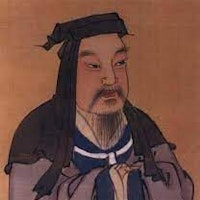Humanity Is To Love
Topic: Wisdom & Understanding
Love without wisdom means love without discrimination. Wisdom without humanity means knowledge not translated into action. Therefore, humanity is to love mankind and wisdom is to remove its evil.
Tung Chung-shu (179-104 BCE) was a Chinese philosopher and scholar who played a major role in the development of Confucianism. He was born in Guangchuan, China, and was educated in the Confucian classics. He entered the imperial service during the reign of the Emperor Jing of Han and rose to high office under the Emperor Wu of Han.
Tung was a strong advocate of Confucianism, and he argued that it should be the official ideology of the Chinese state. In 136 BCE, his arguments were successful, and Confucianism became the official state religion of China.
Tung's most important work was the Luxuriant Dew of the Spring and Autumn Annals, a collection of essays on Confucian philosophy and political theory. In this work, Tung developed a comprehensive theory of the universe, society, and government. He argued that the universe is governed by the principle of tianming, or the Mandate of Heaven. This mandate is bestowed on those who rule in accordance with the will of Heaven. If a ruler fails to rule in accordance with the will of Heaven, he will lose the mandate and be overthrown.
Tung also argued that the ideal society is one that is based on the principles of ren (humanity) and li (ritual). Ren is the love of all people, and li is the proper conduct of oneself in society. A society based on these principles will be harmonious and prosperous.
Tung Chung-shu's ideas had a profound influence on Chinese society and government for centuries. His work helped to shape the development of Confucianism into the dominant ideology of China. His ideas are still studied and debated today.
Commentary on The Spring and Autumn Annals
Wilson, Andrew, editor. World Scripture II. Universal Peace Federation, 2011, p. 729 [Tung Chung-Shu (Commentary on The Spring and Autumn Annals)].

Tung Chung-Shu
Theme: Wisdom


About This Tung Chung-Shu Quotation [Commentary]
Tung Chung-Shu, a profound thinker of the Han dynasty, eloquently interprets the concepts of humanity and wisdom through his insightful commentary on Confucius’ “The Spring and Autumn Annals.” In the quote, “Humanity is to love mankind and wisdom is to remove its evil,” Tung Chung-Shu encapsulates the essential responsibilities of a moral individual in society. He emphasizes that humanity, or ‘jen’, extends beyond mere affection for others; it is an active engagement in fostering love and compassion towards all mankind. This interpretation aligns with the Confucian ideal that the well-being of the community is paramount, and that every individual has a role in nurturing this communal harmony.
Further, Tung Chung-Shu distinguishes wisdom from mere knowledge by suggesting that true wisdom involves a discerning removal of malevolence from human conduct. His assertion that “Wisdom without humanity means knowledge not translated into action” underscores the futility of wisdom that does not serve moral ends. In this light, wisdom is seen not just as an intellectual attainment, but as a practical tool for moral refinement and action. Wisdom, according to Tung Chung-Shu, is the capacity to discern right from wrong and the courage to act on this discernment, thus purifying society from its intrinsic evils.
The synthesis of humanity and wisdom proposed by Tung Chung-Shu offers a compelling framework for ethical living. His commentary reveals a nuanced understanding of the interplay between these virtues, where humanity calls for a universal compassion, and wisdom demands a vigilant rectification of the self and society. This dynamic interplay enhances the moral fabric of society, ensuring that love is guided by moral discernment and that wisdom is always in service to the greater good. Thus, Tung Chung-Shu’s philosophy not only enriches our understanding of Confucian teachings but also offers timeless guidance on the cultivation of a harmonious and just society.
Tung Chung-Shu, Commentary on The Spring and Autumn Annals
Commentary From Wing-Tsit Chan
Related Quotes
Copyright © 2017 – 2025 LuminaryQuotes.com About Us